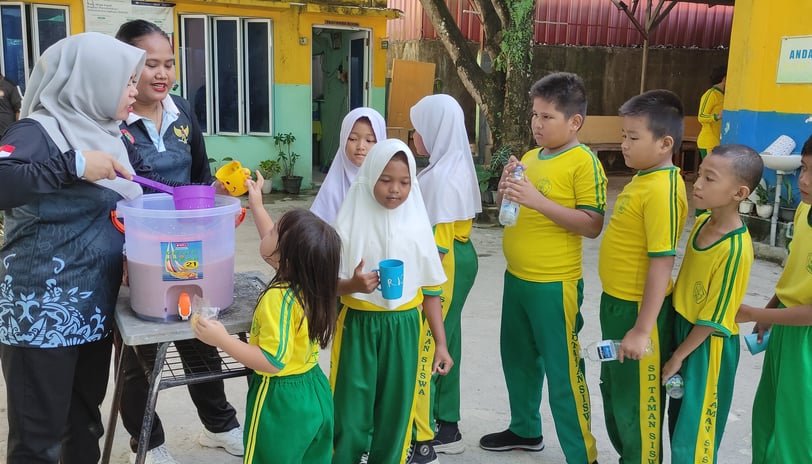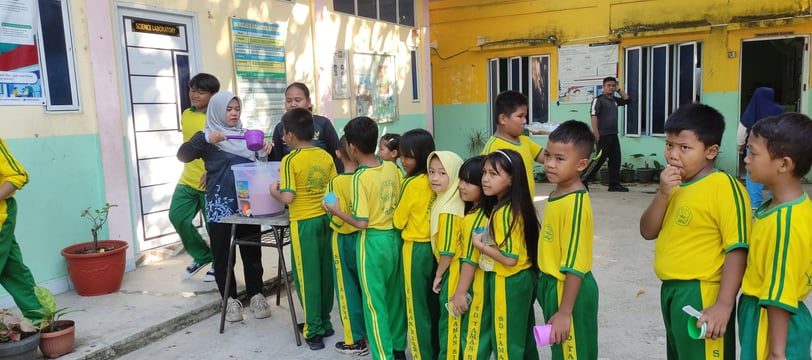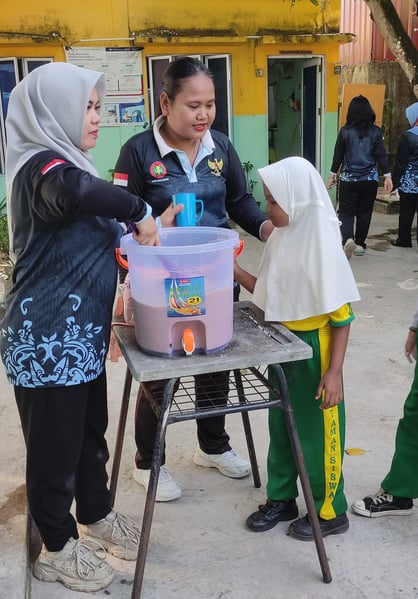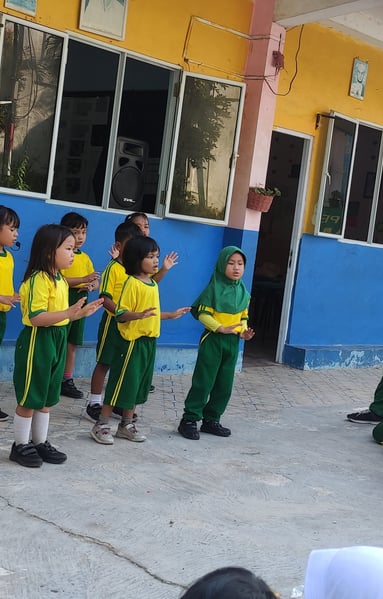A Healthy Start to a Brighter Future: Taman Siswa Batam's Free Milk Program
Taman Siswa Batam Educational Institution is proud to announce the launch of its Free Milk Program, a new initiative aimed at improving student health, concentration, and academic performance through daily nutrition support.


Introduction to the Free Milk Program
Taman Siswa Batam has recently launched a significant initiative aimed at enhancing student health and well-being—the Free Milk Program. This program is designed to provide students with free milk, ensuring that they have access to essential nutrients during their formative years. The initiative not only addresses nutritional deficiencies but also contributes to the holistic educational framework that Taman Siswa Batam stands for. By incorporating milk into the daily routines of students, the program seeks to support their physical growth and cognitive development, aligning perfectly with the institution's mission to promote overall well-being.
The Free Milk Program is rooted in the understanding that proper nutrition is critical to academic success. Milk is rich in calcium, protein, and vitamins, which are vital for children's growth. By introducing this program, Taman Siswa Batam aims to reduce instances of malnutrition among its students. It focuses on eliminating barriers that might prevent children from accessing nutritious food, thus reinforcing the idea that a healthy diet is foundational for learning and development.
The Importance of Nutrition in Education
Nutrition plays a fundamental role in the holistic development of children, particularly in fostering their academic success and overall health. An adequate supply of essential nutrients is crucial for young learners, as their bodies and brains are still developing. Research consistently demonstrates that proper nutrition directly impacts cognitive functions such as memory, concentration, and problem-solving skills. For students, the ability to concentrate in class is pivotal to absorbing information and excelling academically.
Moreover, adolescent bodies require specific vitamins and minerals to support rapid growth and development. For instance, deficiencies in essential nutrients, such as iron, zinc, and omega-3 fatty acids, can lead to hindered brain development and reduced cognitive capabilities. Additionally, a well-balanced diet supports the immune system, thereby enhancing students' overall health, reducing absenteeism, and enabling them to participate more actively in school activities. This underscores the importance of initiating healthy eating habits early in life.
The school environment serves as a critical platform for promoting nutrition. By providing access to healthy food options, educational institutions can help mitigate nutritional deficits often experienced by students from economically disadvantaged backgrounds. Programs such as Taman Siswa Batam's Free Milk Program exemplify this approach; they aim not only to nourish students but also to create awareness about the significance of dietary habits. When students have access to fortified milk and nutritious meals, they are likely to experience improvements in their educational performance and social interactions.
In conclusion, prioritizing nutrition within the educational framework is essential for nurturing well-rounded, capable individuals. When students receive the proper nutrients, they are better equipped to focus, learn, and thrive in their academic pursuits, ultimately leading to a brighter future for themselves and their communities.
Nutritional Benefits of Milk
Milk is often regarded as a staple in the diet of children, primarily due to its rich nutrient content. It is a significant source of essential nutrients, including calcium, protein, vitamins, and minerals. Calcium, in particular, plays a crucial role in developing strong bones and teeth, making it indispensable for children during their growth phases. This mineral is vital for maintaining bone density, which can lead to a reduced risk of fractures in later life.
Moreover, milk is an excellent source of high-quality protein, which is essential for the growth and repair of tissues. Protein supports the overall development of muscle mass and contributes to the building of important enzymes and hormones. For children in their formative years, adequate protein intake is necessary to support their active lifestyles and educational pursuits, as it nurtures cognitive function and enhances vitality.
In addition to calcium and protein, milk is fortified with vitamins A and D, which are crucial for maintaining healthy vision and immune function. Vitamin A supports the body's ability to fight infections, while vitamin D aids in calcium absorption, working synergistically to enhance bone health. Milk also contains B vitamins, which are essential for energy production and cognitive development, promoting effective brain function and concentration in students.
Given these nutritional benefits, incorporating milk into a child's diet can significantly bolster their physical and cognitive development. This makes milk an ideal nutritional choice for students, as it not only provides the necessary nutrients for growth but also supports overall well-being. Accessible initiatives, such as Taman Siswa Batam's Free Milk Program, play a pivotal role in ensuring that children receive these essential nutrients, fostering healthier habits that can lead to brighter futures.
Implementation and Logistics of the Program
The effective implementation of the Free Milk Program at Taman Siswa Batam is rooted in careful planning and collaboration with various stakeholders. In order to maximize the reach and efficacy of the program, it has been designed to benefit students across multiple grade levels, specifically from kindergarten to grade six. This inclusive approach ensures that a broad spectrum of students receives the nutritional benefits of milk, reinforcing the program's commitment to promoting health and well-being.
Distribution logistics are essential to the smooth operation of the Free Milk Program. Milk will be delivered to the school on a regular schedule, ensuring a consistent supply that aligns with students' daily routines. The program is slated to provide milk three times a week, with each student receiving a 200-milliliter serving per occasion. This thoughtful allocation and frequency cater not only to the students' nutritional needs but also aligns with best practices for childhood dietary guidelines.
Partnerships with local dairy providers play a pivotal role in the success of this initiative. The school has engaged with several reputable local dairies to ensure the highest standards of quality and safety in the milk provided. By sourcing milk from these trusted suppliers, Taman Siswa Batam prioritizes the health of its students, while also supporting local businesses and contributing to the community's wellbeing. Additionally, collaboration with dairy experts for educational sessions will enhance students' awareness of nutrition, enabling them to appreciate the significance of milk in their diets.
Through meticulous planning, strategic partnerships, and a clear focus on logistics, Taman Siswa Batam’s Free Milk Program stands as a model of effective implementation aimed at fostering a healthier future for its students.
Expected Outcomes and Goals
The implementation of the free milk program at Taman Siswa Batam is anticipated to yield numerous beneficial outcomes that align with the overarching goal of enhancing student health and overall development. One of the primary objectives of the program is to improve the nutritional status of students, particularly in a region where malnutrition may pose significant challenges. By providing free milk, the school aims to ensure that all students receive essential nutrients that are vital for growth and cognitive functioning.
In terms of health improvements, the availability of milk is expected to contribute to better hydration and increased energy levels among students. This boost in physical well-being can have direct implications for their academic performance. Research suggests that a balanced diet, complemented by adequate dairy intake, can lead to improved concentration, memory retention, and classroom engagement. Therefore, a key goal of the program is to facilitate a supportive learning environment through enhanced nutritional health.
Beyond health improvements, Taman Siswa Batam also plans to track various metrics to measure the program's success. These metrics include student attendance rates, academic performance indicators such as grades and test scores, and overall student engagement levels. The school is committed to conducting regular evaluations to analyze the impact of the free milk program on these benchmarks. This systematic approach aims not only to ensure the program's sustainability but also to identify areas for potential improvement.
Ultimately, by focusing on these expected outcomes and goals, the free milk program at Taman Siswa Batam strives to create a stronger foundation for students, promoting both their short-term academic success and long-term health benefits that will contribute to a brighter future.
Community Engagement and Support
The success of the free milk program at Taman Siswa Batam hinges significantly on the active engagement and support of the local community. Parents play a crucial role in advocating for their children’s health, expressing the need for nutritional support, and participating in program-related activities. Their involvement ensures that the initiative is responsive to the needs of the students and promotes healthy eating habits at home, which complement the nutritional benefits of the program. By fostering strong relationships between parents and the school, Taman Siswa Batam cultivates a proactive environment that prioritizes the well-being of children.
Local businesses also contribute immensely to the program's sustainability and outreach. By partnering with Taman Siswa Batam, businesses can provide financial support, resources, or even donate milk and other nutritional products. This collaboration not only fulfills corporate social responsibility but also strengthens community ties, emphasizing the importance of collective efforts in enhancing public health. In addition to direct contributions, businesses can support the program by facilitating informative workshops or events that raise awareness about the significance of nutrition and the impact of the free milk initiative on students' health.
Furthermore, health organizations play an essential role by offering expertise and resources to enhance the program’s impact. By providing nutritional education, conducting health screenings, or supplying information on best practices for maintaining a balanced diet, these organizations enable Taman Siswa Batam to implement a more comprehensive health initiative. The collaboration between educators, health professionals, parents, and local businesses creates a supportive network that can adapt and grow, addressing both immediate nutritional needs and long-term health goals. This multifaceted approach ensures that the free milk program not only meets its objectives but also fosters a healthier future for all students involved.
Conclusion and Future Prospects
In evaluating the success of Taman Siswa Batam's Free Milk Program, one can conclude that the initiative plays a pivotal role in enhancing the overall health and well-being of students. Access to nutritious milk is crucial as it contributes to essential dietary needs and promotes cognitive development among children. Recognizing the interdependence between nutrition and education, the school underscores its unwavering commitment to fostering an environment conducive to learning and personal growth.
This program not only provides students with daily servings of milk but also serves as a foundation upon which other wellness initiatives can be built. The positive impact that the Free Milk Program has had on student health offers a compelling case for the implementation of additional nutrition-focused programs. Future proposals may include initiatives on healthy eating habits, nutrition education, and even partnerships with local farmers to enhance the menu options available to students. Such endeavors would further solidify Taman Siswa Batam’s strategic aim to promote comprehensive wellness within its educational framework.
Furthermore, the success of this initiative could provide a replicable model for other educational institutions. As more schools recognize the relationship between student nutrition and academic performance, it is foreseeable that similar programs will emerge in various regions, ultimately leading to a broader public health impact. With a solid commitment to ongoing development, Taman Siswa Batam is poised to continually adapt and expand its offerings, ensuring that every child's needs—both academic and nutritional—are met effectively.
As we look ahead, the Free Milk Program at Taman Siswa Batam exemplifies a holistic approach to education, where academic and nutritional investments converge to create brighter futures for students. It reflects a promising direction not only for Taman Siswa Batam but also for the overall trajectory of educational wellness across the community.





